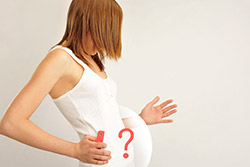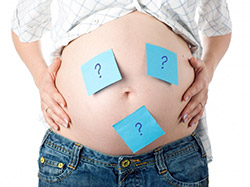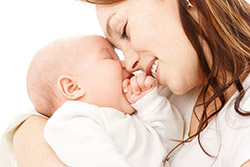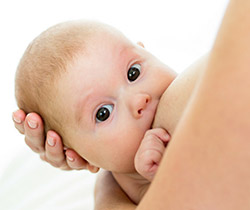 The in vitro fertilization (IVF) procedure is preceded by drug therapy aimed at increasing the concentration of progesterone in a woman's body, which is necessary for the onset of "superovulation". The normalization of the generative function of the ovaries leads to the formation of several dominant follicles, from which several oocytes ready for fertilization are subsequently extracted. After their fertilization, one of the most viable embryos is selected, which is implanted into the uterus. From the moment of its implantation into the endometrial wall, pregnancy begins.
The in vitro fertilization (IVF) procedure is preceded by drug therapy aimed at increasing the concentration of progesterone in a woman's body, which is necessary for the onset of "superovulation". The normalization of the generative function of the ovaries leads to the formation of several dominant follicles, from which several oocytes ready for fertilization are subsequently extracted. After their fertilization, one of the most viable embryos is selected, which is implanted into the uterus. From the moment of its implantation into the endometrial wall, pregnancy begins.
Symptoms of miscarriage
Changes in the endocrine system after hormone therapy significantly affect the primary signs of pregnancy after IVF. Two weeks after successful conception, the concentration of human chorionic gonadotropin (hCG), which is produced by the embryo, increases in the blood serum. In this regard, there are changes in the condition of women, which include:
- enlargement of the mammary glands;
- increased nipple sensitivity;
- decreased appetite;
- fast fatiguability;
- a feeling of discomfort in the lower abdomen.
The clinical manifestations of pregnancy after IVF do not differ significantly from the symptoms characteristic of natural conception. Only some of them are more pronounced due to the artificial maintenance of the required level of female hormones in the organism. Typical manifestations of the onset of gestation are:
- frequent urination;
- toxicosis;
- violation of gastric motility;
- dizziness;
- stool disorders;
- thrush;
- discomfort in the perineum.
The main signs of pregnancy appear 7-8 days after artificial insemination. Against the background of a natural decrease in the body's reactivity, the likelihood of exacerbation of chronic diseases and the development of respiratory infections increases.
Stages of pregnancy
 In about 30% of cases, after successful fertilization with IVF, a spontaneous abortion is diagnosed. In this regard, only experienced obstetricians-gynecologists are engaged in pregnancy management. Conventionally, the entire gestational period is divided into 3 trimesters:
In about 30% of cases, after successful fertilization with IVF, a spontaneous abortion is diagnosed. In this regard, only experienced obstetricians-gynecologists are engaged in pregnancy management. Conventionally, the entire gestational period is divided into 3 trimesters:
- 1 trimester (1-14 weeks) - in the first 12 weeks, the vital organs and systems of the fetus are laid. Women complain of the onset of toxicosis, frequent urination and a change in taste;
- 2nd trimester (15-26 weeks) - fetal development continues, ultrasound is able to recognize the sex of the child. Signs of intoxication completely disappear, the general condition of the woman is considered satisfactory;
- 3 trimester (27-40 weeks) - the final formation of the child's respiratory and cardiovascular system is observed. An increase in fetal mass leads to a deterioration in the well-being of the expectant mother: heartburn, shortness of breath, back pain.
1 trimester
The first trimester is the conception and formation of the embryo, during which the neural tube and vital systems develop. Hormonal changes in the mother's body lead to the appearance of toxicosis, the manifestations of which are:
- nausea;
- stool disorders;
- change in taste;
- dizziness;
- vomiting;
- irritability.
The likelihood of miscarriage during this period is maximum, therefore obstetricians recommend that women be less nervous, give up excessive physical exertion, improve nutrition and normalize the drinking regime.
2 trimester
In the second trimester, the final formation of the placenta is observed, which leads to an intensive supply of nutrients to the fetus. The child develops the visual system, muscles and vocal cords. For a woman, this period is the most favorable, since the signs of toxicosis completely disappear.
Due to the depletion of reserves of vitamins and minerals, it is recommended to take dietary supplements and vitamin-mineral complexes with a high content of retinol, thiamine, lactoflavin, folic acid and B vitamins.
3 trimester
In the last trimester, the intensive development of the child's musculoskeletal and musculo-ligamentous apparatus continues. Due to the increase in fetal weight and the raising of the diaphragm, women may complain of:
- labored breathing;
- increased blood pressure;
- back pain;
- nausea;
- increased body temperature.
To ensure the normal development of the child, it is recommended to include protein foods in the menu and limit the consumption of carbonated drinks. Eat small meals to prevent worsening nausea. On the day of the planned birth, no more than 5% of women become mothers; for most of them, delivery occurs 10-14 days earlier or later than the calculated date.
Miscarriage
 Spontaneous termination of pregnancy is possible up to 37 weeks of gestation. The causes can be endocrine disorders, respiratory diseases, preeclampsia, placenta previa, etc. The main signs of fetal disorders include:
Spontaneous termination of pregnancy is possible up to 37 weeks of gestation. The causes can be endocrine disorders, respiratory diseases, preeclampsia, placenta previa, etc. The main signs of fetal disorders include:
- heat;
- abdominal cramps;
- malaise;
- vomit;
- spotting from the vagina.
Most often, spontaneous miscarriage with IVF occurs between 6 and 10 weeks. It is during this period that up to 78% of abortions are observed.
IVF failure
Even the most modern reproductive technologies cannot guarantee successful conception and bearing of a fetus during artificial insemination. The most common causes of spontaneous abortion are:
- chronic endometritis;
- pathological development of the placenta;
- endocrine disorders;
- adhesions in the uterus;
- exacerbation of infectious diseases.
According to statistics, most IVF failures are due to endometrial pathologies. Polyps, fibroids, scars and inflammation in the uterus interfere with the normal implantation and development of the embryo.
Probability of natural conception after IVF failure
 Before the IVF procedure, women undergo preliminary training, thanks to which the functions of the ovaries are normalized. After hormone therapy, the likelihood of self-conception increases 2-3 times. Approximately 17% of women, after unsuccessful IVF, had a natural pregnancy. To increase the likelihood of conception, you must:
Before the IVF procedure, women undergo preliminary training, thanks to which the functions of the ovaries are normalized. After hormone therapy, the likelihood of self-conception increases 2-3 times. Approximately 17% of women, after unsuccessful IVF, had a natural pregnancy. To increase the likelihood of conception, you must:
- eliminate vitamin and mineral deficiencies;
- use drugs to stimulate the production of progesterone;
- conduct immunostimulating therapy;
- improve the quality of food.
Self-conception is possible only under the condition of reversible infertility and disorders in the partner's reproductive system. The onset of pregnancy is impossible in the presence of the following diseases:
- infantility of the uterus;
- obstruction of the fallopian tubes;
- ovarian dysfunction;
- azoospermia.
Conclusion
 Currently, the probability of conception after IVF varies between 35-38%. Spontaneous abortion and miscarriage are most often associated with pathologies in the development of a woman's reproductive system. With reversible infertility, the chances of natural conception after a miscarriage with IVF increase 2-3 times.
Currently, the probability of conception after IVF varies between 35-38%. Spontaneous abortion and miscarriage are most often associated with pathologies in the development of a woman's reproductive system. With reversible infertility, the chances of natural conception after a miscarriage with IVF increase 2-3 times.

